To kick off 2013 last week I roasted a duck. It was a
festive way to celebrate New Year but also an excuse to practice my whole duck
cooking and use the new stove’s oven. I’ve experimented with deep-fried Sichuan
duck and roast Peking duck. Vietnamese people often roast duck with red fermented
tofu (vit nuong chao) so I decided to
combine various methods and best-practices into one. It was a delicious duck
that we ate over the course of two dinners.
Instead of a normal recipe format,
I’m going to do walk you through the process so you can apply them
later on. Hey, Lunar New Year isn’t far away. A roast duck could be part of
your menu for launching the Year of the Snake!
Caveats: Start 2 or 3 days in advance for this recipe. Ideally, it
air-chills for 48 hours in the fridge. You’ll need a vertical poultry roaster, which can be ordered online or found at cookware shopes and places like Bed Bath & Beyond.
And if you’re interested in seasoning and coloring the duck
with red fermented tofu, head to a Chinese market. Red fermented tofu is a stealth ingredient in lots of Chinese
classics and Chinese-influenced dishes in Southeast Asia. (See Asian Tofu for more recipes). This is an excellent brand that's sold at Chinese markets:
Here we go...
1. Buy a whole duck:
I normally go to Chinese or Vietnamese market where whole ducks – with their
head and feet intact are sold. Last week, I was lazy so bought a duck from my local
butcher shop. It was headless and feetless, raised and processed by Mary’s
ducks in California. It weighed 5 ½ pounds (2.475 kg). The ducks from Asian
markets tend to be smaller but the trade off is that with the head intact, I
could prep it a little easier. Mary’s duck was free-range and had been trimmed
so that the breast was partially exposed, meaning that it may dry out during
roasting. Would any of this matter? I
was not sure but I was too lazy to drive an hour to buy a duck last week.
For 4 people, buy: 1
duck, about 5 pounds (head and feet optional)
2. Trim the wing tips
and fat: Who needs this extra stuff? Use a pair of scissors to cut off the
wing tips, which get in the way of the skin evenly browning. There’s also
excess fat in the lower part of the bird so reach into its stomach cavity and
remove the fat. Or, cut it off with a knife. Save the fat for cooking.
3. Wash and massage the
duck: To loosen the skin and rid the duck of any foul smell, rub it inside
and out with lots of salt, then rinse well.
For rubbing: 2 to 3 tablespoon uniodized table salt or
kosher salt
4. Blow up the duck:
If you want the fat to drain out and the skin to crisp, blow up the duck. That
is, force air in between the flesh and fat – on the breast and back sides. During
roasting, the fat melts away and the skin crisps.
I did this for Peking
duck recipe way back with an exercise ball pump. For details, see this post.
The Mary’s duck didn’t show 6-pack abs like the Chinese-market duck but you
understand the idea. Poke holes into the skin then force air in.
5. Skewer and scald
the duck. Sorta sew up the cavity with a bamboo skewer to prevent hot water
from going inside the duck. Put the duck on a roasting rack and set in the
sink. Bring a kettle of hot water to a boil. Turn it off and then pour the super
hot water over the duck. Turn the duck to scald the other side.
6. Rub seasonings all
over the skin: I wanted to feature red fermented tofu for its umami
goodness (think sweet-salt blue cheese) and deep color. Here’s what I blended
together for last week’s roast duck
seasoning:
- 1 tablespoon mashed fermented red tofu
- 2 tablespoons fermented red tofu brine
- 2 cloves garlic, put through a press or minced
and mashed with a knife - 2 tablespoons Shaoxing rice wine
- 2 tablespoons honey
You can opt for hoisin, five spice powder, honey and rice
wine. The honey produces a bit of a sheen as well as a sweetness. Whatever you
do, aim for a heady, salty-sweet flavor. When you’re satisfied, rub the
seasonings all over the duck, including its armpits. Keep the duck on the
roasting rack.
7. Air-chill the duck.
Transfer the duck and rack to a roasting pan or baking pan. Then slide it
into the fridge, uncovered. Leave the duck alone for at least 1 night, better
yet 2 nights. You want to dry out the skin. It should feel dryish to the touch.
Removing excess moisture helps to crisp the skin in the oven. Last week, I
air-chilled the duck for only one night and regretted not starting the duck 2 days in advance.
8. Roast the duck
using a vertical roaster. The vertical roaster, one of my favorite
cheap kitchen tools, is deployed for the purpose of roasting whole ducks. (Note
that with this approach, you can theoretically roast 2 or 3 ducks standing up
in a home oven. Just an idea.)
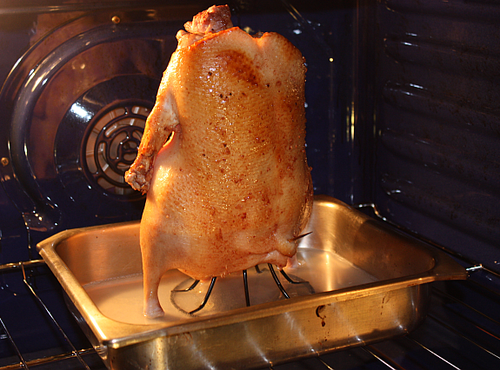
The idea is to use high heat at first to quickly brown the duck, then switch to low and slow roasting. And, the duck has to stand in the oven.
That said, position a rack on the lowest rung of the oven and preheat
to 450F. Return the duck to room temp, put it on the vertical roaster, then in
a roasting pan. Add ¼ inch of water to the pan to avoid smoking fat in the
oven. Then roast the duck for 10 to 15 minutes, until the skin is dark brown.
Lower the heat to 350F, then roast for about 15 minutes per
pound. The fat should drip off into the water in the pan. Rotate the pan to
encourage even browning. Let the duck cool for 15 minutes or so before carving
or hacking into bite-size pieces.
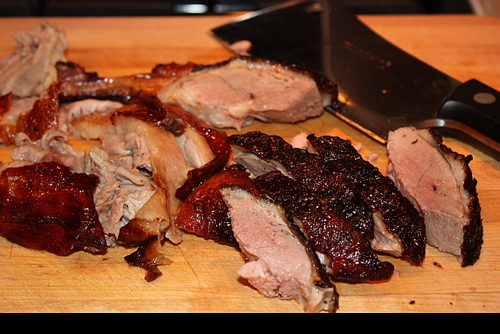
Serve with a little hoisin sauce mixed with
sesame oil and water. Tuck the duck with a lick of sauce into steamed
Chinese rolls with some green onion
shreds. (Pancakes, the same ones used for mushu, are for northern style, Peking
duck.)
Mary’s Ducks vs.
Chinese market ducks? The Mary’s duck had delicious flesh but the upper
part of the breast dried out a tad because of the way that the duck is trimmed
for shipping. On the other hand, it had a lot more heft on its bones. I’m on
the fence. I suppose that if you’re squeamish about looking your food in the
eye the Mary’s duck is for you. The ducks from Asian markets take a little more
gumption to deal with but most of the time, they’ve not been frozen. What’s
important here is this: you can make amazing Chinese-style roast duck with a
specimen from a mainstream market.
Once that you’ve roasted a duck Chinese-style, you’ll
understand that it’s not that hard. You do all the prep work in advance and at
the end, you slide it into the oven for roasting. It’s genius cooking.
Related posts:












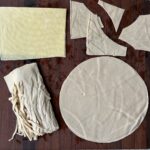
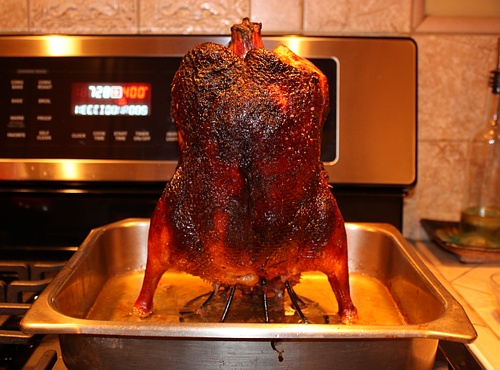
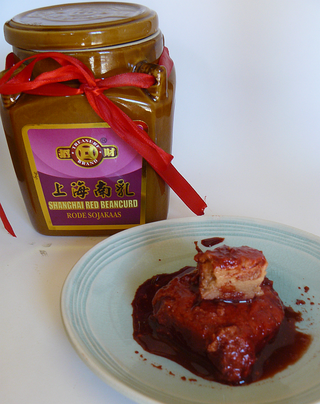
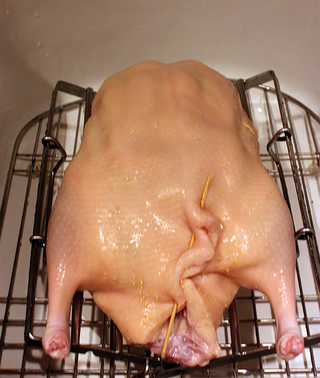




Maggie says
Happy New Year, Andrea! Thank you for this, I'll give it a go. My family enjoy roast duck, but the restaurant ones are often fatty (not enough heat at the beginning, maybe?), and every piece of meat has bone attached, which we drives us mad.
Betty says
I do try to make own roast duck when there time. I sometime buy ready made one and not have it chop up to make Beijing Duck with pancake at home for quick and easy meal. The bones make into soup or deep fried crisp to have as side dish.
Andrea Nguyen says
You're right, Maggie. It's about the blowing up and drying out of the ducks. That's what I've found to be key. I feel like the roast ducks that I typically get at the Chinese bbq shops don't get blown up. Give it a whirl! Happy New Year.
Andrea Nguyen says
Oh, yeah, Betty. I love to make the pancakes for special dinners. The LA Times story that I link to details how to make a Peking duck meal at home. That was a fun article to write... 😉
John says
Hi Andrea,
I am a big fan of your cooking. I have all three of your cookbooks and all the recipes I have tried have been fabulous. I have a favor to ask. Do you know of a good recipe for Banh men? My mom used to make it when we were kids. She passed away two years ago and I have been trying to replicate it to no avail. Just tons of wasted tapioca flour and coconut milk. Thanks for your help.
Vickie says
A easy stuffed duck is with read made one and chop up and debone. I use barley and waterchestnuts and black mushroom other ingredient for it. Some call it eight treasure duck sever at party. It layer in a bowl like a terrine with filling in center and steam. It later flip out and serve with sauce made with soy sauce and duck bone stock and some oyster sauce and sesame oil dash of sugar and cornstach. Sorry I been eye measure for years in this recipe.
charsiew says
Thanks for the helpful tips! I'm going to try roasting my duck this way. Re point 4 that you made - If I poke holes into the duck then blow air in, wouldn't the air escape through those holes when I pump air in?
stein says
I got my duck all set to go last night and I'll roast it on Saturday, giving it more like 60 hours in the fridge. Cracked me up when I first pumped it up. I literally laughed out loud. What fun. Hey, did you use your convection fan for extra dryness?
Sunshine says
Hi- should I baste the duck or not while roasting? Does basting undo the two days of air-drying? I just put on a layer of hoisin sauce, honey and five spice, let it dry for 8 hours and then put on a second layer...and intend to let it air-dry the night over in the garage (it's cold outside). Thank you!